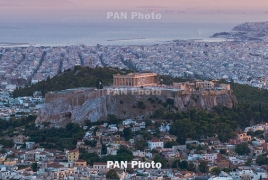
The Votanikos Mosque in Athens is set to open its doors to worshippers in the coming weeks, after years of backlash from the Orthodox Church and protests from locals, RT reports.
Deputy Foreign Minister Marcos Bolaris confirmed on Tuesday, April 9 that the mosque – financed by the Greek state at a cost of almost €900,000 – will open its doors in the coming weeks. Multiple applications to build the mosque had been debated and stalled since 2000, and construction on the current building finally began in late 2016, albeit after police had cleared protesters from the site.
Until now, Athens remained the only European capital without a mosque. While some Ottoman-era mosques still stand in the city, they serve as archeological monuments instead of houses of prayer. After almost 400 years of often brutal Ottoman occupation, the Greek government has not approved the construction of a single new mosque since Greece secured its independence in 1830.
Estimates of Athens’ Muslim population range from less than 100,000 up to 500,000, when illegal immigrants and refugees are taken into account. Until now, these Muslims have been forced to pray in converted living rooms and basements dotted around the city.
Opposition to the mosque has been stiff. Nikolaos Michaloliakos, leader of the far-right Golden Dawn party, savaged the proposal in parliament in 2016. Calling the mosque a “shrine to slavery,” Michaloliakos asked “Are we returning to Turkish occupation?”
While Golden Dawn occupy the farthest right political position in Greece, many ordinary Greeks still associate Islam with conquest and occupation. A 2017 survey found that only a third of the country’s population viewed the term ‘Muslim’ positively. 28 percent viewed the term ‘Turks’ positively, indicating that to many, Islam is a concept inseparable from the dark days of the Ottoman Empire.
The country’s Orthodox Church, to which 98 percent of the population subscribe, has opposed the mosque too. Archbishop Ieronymos II of Athens, the leader of the church in Greece, warned that the mosque’s construction was part of a plan to "de-Hellenize and de-Christianize" the nation, and called mosques breeding grounds of radicalization.

